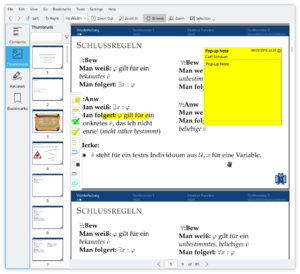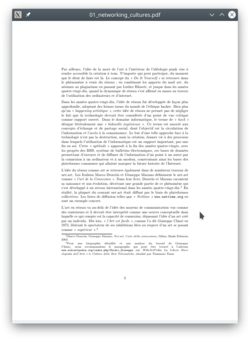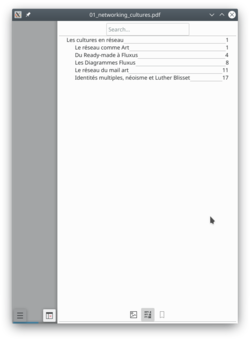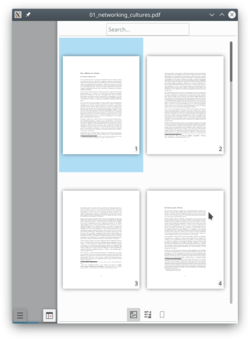Okular/da: Difference between revisions
(Updating to match new version of source page) |
(Updating to match new version of source page) |
||
| Line 12: | Line 12: | ||
'''Okular''' kombinerer [[Special:myLanguage/KPDF|KPDF's]] fremragende funktionalitet med evnen til at fremvise mange forskellige slags dokumenter som PDF, Postscript, DjVu, CHM og andre. | '''Okular''' kombinerer [[Special:myLanguage/KPDF|KPDF's]] fremragende funktionalitet med evnen til at fremvise mange forskellige slags dokumenter som PDF, Postscript, DjVu, CHM og andre. | ||
The [https://okular.kde.org/formats.php document format handlers page] has a chart describing in more detail the supported formats and the features supported in each of them. | |||
[[Image:Okular-annotations.png|thumb|300px|center|Annotering i Okular, som kan gemmes i PDF-filen]] | [[Image:Okular-annotations.png|thumb|300px|center|Annotering i Okular, som kan gemmes i PDF-filen]] | ||
As well as supporting many formats, '''Okular''' offers such features as text selection, annotation, extraction of files embedded within a document, and many other surprises. Screenshots of '''Okular''' in action can be seen [https://okular.kde.org/screenshots.php here]. | |||
Du kan kontakte udviklerne og andre brugere på IRC kanalen irc.freenode.org, [irc://irc.kde.org/#okular #okular]. | Du kan kontakte udviklerne og andre brugere på IRC kanalen irc.freenode.org, [irc://irc.kde.org/#okular #okular]. | ||
If you are interested in contributing to '''Okular''', please [https://okular.kde.org/contact.php contact the team]. Programmers and non-coders are welcome all the same. | |||
== Mobile Version == | == Mobile Version == | ||
| Line 38: | Line 38: | ||
=== Forhåndsvisning af dokumenter / annoteringer === | === Forhåndsvisning af dokumenter / annoteringer === | ||
Double-clicking on either one of the '''Review''' tools (<keycap>F6</keycap>) allows you to make multiple annotations without having to reactivate the tool after the first time. | |||
Hvordan du gemmer dine annoteringer i PDF-filen | Hvordan du gemmer dine annoteringer i PDF-filen | ||
| Line 46: | Line 46: | ||
=== DRM === | === DRM === | ||
By default, Okular | By default, Okular follows the PDF specification and don't allow copying text from DRM protected files. However, there is an option in the settings to disable DRM limitations in <menuchoice>Settings -> General -> Program Features -> Obey DRM limitations</menuchoice> | ||
There was a small controversy in the Debian bug tracker a long time ago, about the default choice to Obey DRM limitations<ref>[https://lists.debian.org/debian-devel/2009/05/msg00879.html DRM and Okular in Debian bug tracker]</ref><ref>[https://lwn.net/Articles/335415/ DRM and Okular in LWM]</ref>. The choice was then [https://tsdgeos.blogspot.com/2009/06/okular-pdf-and-drm.html explained] by an Okular/KPdf developer<ref>[https://tsdgeos.blogspot.com/2009/06/okular-pdf-and-drm.html Okular, PDF and file permissions]</ref>. | There was a small controversy in the Debian bug tracker a long time ago, about the default choice to Obey DRM limitations<ref>[https://lists.debian.org/debian-devel/2009/05/msg00879.html DRM and Okular in Debian bug tracker]</ref><ref>[https://lwn.net/Articles/335415/ DRM and Okular in LWM]</ref>. The choice was then [https://tsdgeos.blogspot.com/2009/06/okular-pdf-and-drm.html explained] by an Okular/KPdf developer<ref>[https://tsdgeos.blogspot.com/2009/06/okular-pdf-and-drm.html Okular, PDF and file permissions]</ref>. | ||
| Line 52: | Line 52: | ||
=== PDF Signature and certificate === | === PDF Signature and certificate === | ||
Okular can verify if a PDF certificate is valid. But you can not yet create a new signature. See [https://tsdgeos.blogspot.com/2019/01/okular-pdf-signature-certificate.html release note] for more information. | Okular can verify if a PDF certificate is valid. But you can not yet create a new signature. See the [https://tsdgeos.blogspot.com/2019/01/okular-pdf-signature-certificate.html release note] for more information. | ||
== More Information == | == More Information == | ||
Revision as of 11:50, 4 February 2019
Hvad er Okular?
Okular is a universal document viewer developed by KDE. Okular works on multiple platforms, including but not limited to Linux, Windows, Mac OS X, *BSD, etc.
Du kan følge udviklingen på projektets hjemmeside.
Baggrund
Its development began as part of Google's Summer of Code program. The description of the project can be found at KDE Developer's Corner.
Okular kombinerer KPDF's fremragende funktionalitet med evnen til at fremvise mange forskellige slags dokumenter som PDF, Postscript, DjVu, CHM og andre.
The document format handlers page has a chart describing in more detail the supported formats and the features supported in each of them.

As well as supporting many formats, Okular offers such features as text selection, annotation, extraction of files embedded within a document, and many other surprises. Screenshots of Okular in action can be seen here.
Du kan kontakte udviklerne og andre brugere på IRC kanalen irc.freenode.org, #okular.
If you are interested in contributing to Okular, please contact the team. Programmers and non-coders are welcome all the same.
Mobile Version
Okular has a mobile version since version 0.16 release in February 2013 [1]. The first version was based on the active framework. The mobile viewer was then ported to Kirigami in 2016 by Marco Martin[2] and finally to Kirigami2 in 2017[3].
The mobile version doesn't support all features from the desktop version, but provide better touch support and a mobile interface.
You can test the mobile version in your PC by entering
okularkirigami
in your terminal.
Tips og tricks
Forhåndsvisning af dokumenter / annoteringer
Double-clicking on either one of the Review tools (F6) allows you to make multiple annotations without having to reactivate the tool after the first time.
Hvordan du gemmer dine annoteringer i PDF-filen
Som udgangspunkt gemmer Okular annoteringer i den enkelte brugers lokale mappe. Fra KDE 4.9 kan man vælge at gemme dem direkte i PDF-filen ved at vælge , sådan at de kan vises i andre PDF-fremvisere. Bemærk, at denne funktion kræver Poppler 0.20 eller nyere for almindelige PDF-dokumenter. Hvis det PDF-dokument du annoterer er krypteret, så kræves Popplaer 0.22 eller nyere.
DRM
By default, Okular follows the PDF specification and don't allow copying text from DRM protected files. However, there is an option in the settings to disable DRM limitations in
There was a small controversy in the Debian bug tracker a long time ago, about the default choice to Obey DRM limitations[4][5]. The choice was then explained by an Okular/KPdf developer[6].
PDF Signature and certificate
Okular can verify if a PDF certificate is valid. But you can not yet create a new signature. See the release note for more information.
More Information
- Official KDE documentation
- Okular website
- Okular API documentation
- Okular phabricator project
- Okular git repository



